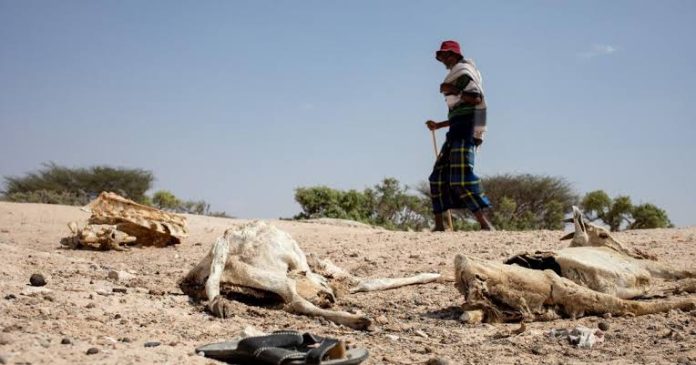Facebook Twitter (X) Instagram Somali Magazine - People's Magazine
A devastating drought in Somalia has led to the deaths of at least 71,000 people beyond the expected mortality rate, according to a recent study commissioned by the United Nations Children’s Fund (UNICEF), the World Health Organization (WHO), and Somalia’s Ministry of Health. The report, which covers the period from January 2022 to June 2024, highlights the catastrophic impact of five consecutive failed rainy seasons, pushing parts of the country to the brink of famine.
The study, conducted by the London School of Hygiene and Tropical Medicine, Imperial College London, and Somalia’s SIMAD University, found that 40% of the lives lost were children under the age of five. Dr. Najib Isse Dirie, deputy director for research at SIMAD University, explained that the “excess deaths” were a direct result of the prolonged drought, which devastated livelihoods, destroyed crops, and forced thousands into overcrowded displacement camps.
“Living in overcrowded IDP camps, loss of livelihoods, and the lack of rainfall severely impacted crop yields and made people vulnerable,” Dr. Dirie told VOA Somali. The drought has left millions of Somalis struggling to access food, clean water, and healthcare, exacerbating an already dire humanitarian crisis.
At the report’s launch in Mogadishu on Wednesday, Dr. Renee van De Weerdt Renhilde, WHO’s representative to Somalia, described the findings as a stark reminder of the urgent need for continued support and resilience-building efforts in the country. “The findings of this study highlight the profound impact that the 2022–2024 drought has had on the lives of the Somali people,” she said. “This underlines the critical importance of strengthening Somalia’s health emergency prevention, preparedness, readiness, and resilience systems.”
Dr. Renhilde emphasized the WHO’s commitment to collaborating with the Somali government and international partners to ensure communities are not only protected during crises but also empowered to recover from future shocks. Somali Health Minister Dr. Ali Hadji Adam Abubakar echoed this sentiment, outlining plans to prioritize vulnerable children and women in efforts to mitigate the impact of future droughts.
“For my ministry, our focus is on creating a strong and robust health system as the cornerstone of a healthy and thriving Somali society,” Abubakar said. However, the road to recovery remains steep. The United Nations recently launched an appeal for $1.43 billion to address the ongoing humanitarian crisis in Somalia, warning that approximately 6 million people will require aid in 2025.
The UN Office for the Coordination of Humanitarian Affairs (OCHA) stated that Somalia continues to face a complex and protracted crisis fueled by conflict, insecurity, disease outbreaks, and recurrent climate shocks such as droughts and floods. The situation is reminiscent of the 2011 famine, which claimed over 250,000 lives, underscoring the urgent need for sustained international support.
The study’s findings serve as a grim reminder of the devastating consequences of climate change and the importance of global solidarity in addressing humanitarian crises. As Somalia grapples with the aftermath of the drought, the international community must act swiftly to prevent further loss of life and build resilience against future disasters.

